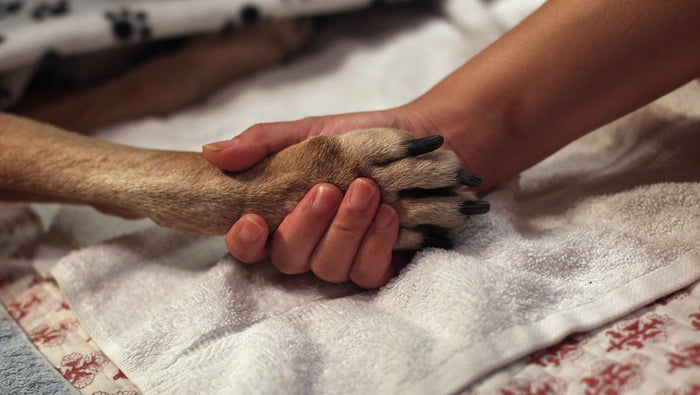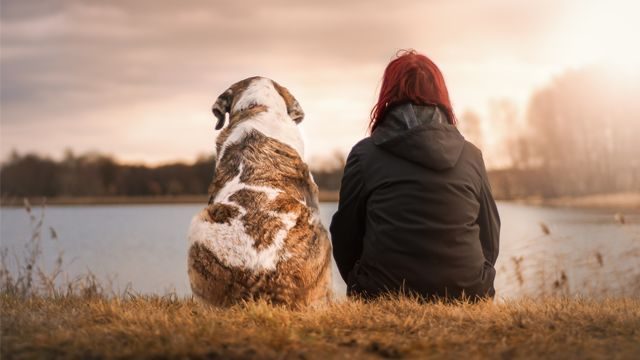“Until one has loved an animal, a part of one’s soul remains unawakened.” — Anatole France
A pet owner’s worst fear is losing a beloved companion. For those who have experienced this loss, there is usually a poignant story to share about a cherished dog or cat’s passing. From one pet owner to another, we understand the intense pain and emptiness that occurs after this loss. There is no correct way to grieve and work through this process, as everyone walks down a different journey with a pet.
A pet may symbolize a child, sibling, best friend or long-term companion. Dogs and cats live an average of 13 years—enough time to truly enter and live in your heart. They become a part of your family and daily life. Your morning routine may not be complete without playing fetch or going on a walk with your dog or snuggling with your feline.
The death of a pet can be a truly traumatic experience and create a large void in our hearts and lives—comparable to losing a close family member or friend. As humans, we project onto our beloved pets our thoughts, emotions, and ideas: We see ourselves in our animals. The common belief that “owners come to look like their pets” may not be a literal truism but rather a figure of speech indicating that our pets are our self-objects.

My own four-legged family members
I have had seven dogs, so I could be biased when I call them “running love.” Many people have known their dogs longer than their wives or children, so it is not surprising that their loss can be devastating even if it’s not sudden. I didn’t realize their stealthy Cupid effects until one of mine, a German Shepherd named Snitzel, went missing for three tearful days.
When a burly gravel truck driver made sexually provocative comments to my wife, Snitzel came running, without a word, snarling and taking up a protective position at her side, and that ended his comments and presence. And there are numerous examples of dogs rescuing humans, traits also observed in combat Marines and expressed in their mantra “Semper Fidelis” (always faithful or always loyal). Not surprisingly, a 1988 study in the Journal of Mental Health Counseling found that dog owners placed their dog as close as their closest family member and the closest of all in 38 percent of cases, Joe Yonan reported in The Washington Post.
To understand the kinship of dogs and humans, we might look at the qualities that humans think their friends should have. Laura Argintar in ADVICE suggests they include: no judgment, genuineness, trustworthiness, acceptance, respect, forgiveness, support, dependability, thoughtfulness, being a good listener, sharing humor, love. How does this stack up with the humans we know? Need I say more?

The magnitude of pet loss grief
A pet is truly a gift that can change your life and bring you monumental happiness and gratitude. Pets teach you responsibility, patience, kindness, discipline, playfulness and, most importantly, unconditional love. Even if your dog chews your couch, scratches your doors, and manages to eat every sock you own, you still figure out a way to share your home and heart with your companion.
The death of a pet can hurt as much as the loss of a close relative or friend. It is common for humans to have conflicts with family members over religion, money, politics and so forth—conflicts that may create emotional distance between them. Humans and pets do not have these types of conflicts—pets are 100 percent dependent on their human companion. Yes, you may become angry at your dog for chewing your shoelaces or leaving a “surprise” on your carpet, but these feelings of frustration and anger quickly dissipate after your pet looks up at you with funny ears and wide-open eyes.
According to an article that reviewed multiple studies and was published in the journal Society & Animals in 2002, the death of a companion animal can be as devastating as the loss of a human significant other.

Stages of grief
People who have never had a pet might not understand the loss and may invalidate your feelings as you go through the grieving process, but don’t allow them to dictate your feelings. It is normal to feel devastated after the loss of a pet. It is common to believe that your dog or cat will still be around to greet you at the door when you arrive home. Many people feel disloyal if they decide to adopt another pet.
In her book, On Death & Dying, Elisabeth Kübler-Ross identified five stages of grief: denial, anger, bargaining, depression and acceptance.
Denial is a normal part of the grieving process. Just make sure you don’t deny your grief. Allow yourself to express your feelings in any way that benefits you. Expressing your feelings can be truly cathartic.
Anger is a normal stage of grieving and it is common for pet owners to become angry at the “why” and “how” their pet died. Was it a terrible accident? Was it an incurable disease or illness?
Becoming angry at the reason for the pet’s passing might eventually lead to bargaining. You might say things to yourself like: “If only I could have three more days with Fido.” The constant “what ifs” and “if onlys” can be extremely stressful and unsettling.
Depression or sadness is the fourth stage of grief in the Kübler-Ross model and, for many, the longest stage. Some people will always hold a small amount of sadness in their heart for their beloved pet.
Acceptance is the final stage, but accepting a loss does not mean forgetting the memories. At this stage, you may feel like your life is becoming normal again and you may even consider adopting another pet.

Everyone grieves differently
Grief has no timeline and no boundaries. Everyone grieves differently and for dissimilar lengths of time. Your level of grief may depend on your age and personality, your pet’s age and personality, and the circumstances of your pet’s death, as well as the relationship between you and your animal. Often, individuals who live alone take longer to grieve because their companion played such an important role in their lives. The same is true for disabled people who lose a therapy- or seeing-eye dog, because the animal was not just a companion but also a vital aid to their daily tasks.
If you or a loved one has recently lost a pet, try to remember your companion by keeping the love alive. Maybe frame a photo of your pet, plant a tree in your pet’s memory, create a symbolic gravestone, or, if you cremate your pet, keep the ashes somewhere special. Keeping the memories of your beloved companion alive can be the healthiest way to get through the grief.
3,552 total views, 2 views today

